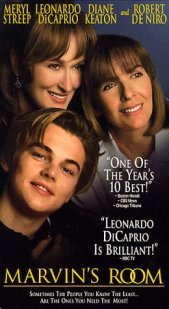 Marvin's
Room (1996)
Marvin's
Room (1996) Marvin's
Room (1996)
Marvin's
Room (1996)
Starring Diane Keaton, Meryl Streep, Leonardo DiCaprio, Robert De Niro,
Hume Cronyn, Gwen Verdon, and Dan Hedaya.
Written by Scott McPherson.
Directed by Jerry Zaks.
Grade: B
Review by Carlo Cavagna.
Marvin's Room is a Hollywood rarity: a terminal illness movie that doesn't beat you over the head with overwrought sentimentality or a big weepy death scene. Bessie (Diane Keaton) has spent years caring for her bed-ridden father (Hume Cronyn) and nutty aunt (Gwen Verdon), but now she is the one who's ill. When her doctor (Robert De Niro) informs her that she will die without a bone marrow transplant, Bessie is forced to pick up the telephone and call her younger sister Lee (Meryl Streep) so Lee's marrow can be tested for compatibility. Lee and Bessie haven't seen much of each other since Lee left town because she didn't want to be burdened with their sick father, leaving Bessie to care for him. Lee readily agrees to be tested, however, and she brings along her two sons, Charlie (Hal Scardino) and Hank (Leonardo DiCaprio), to be tested as well. For this purpose, Hank is temporarily released from the mental institution where he has been confined for burning down the family's house.
In point of fact, Bessie's illness isn't really the story's main concern. Writer Scott McPherson and director Jerry Zaks are more interested in the relationship between the two sisters and Hank's relationship with the world in general. Bessie's condition (leukemia) is the catalyst that brings the characters together and forces them to confront issues that have festered for years. Lee has abandoned Bessie to do all the work of caring for their father, but now that Bessie might die, and need care herself in the interim, Lee must face her responsibilities. Bessie has made little effort to keep in touch with her sister over the years, but now she must bridge the gulf that separates them. Lee and Hank have a horrible relationship--Hank blames Lee for the absence of his father, while Lee is completely unable to communicate meaningfully with her son. However, Hank is drawn to Bessie, in part because of the lingering hostility between Bessie and Lee.
McPherson and Zaks explore all of the complex relationships without melodrama or heavy-handedness, emphasizing realism and the stars' natural acting abilities. Diane Keaton earned a well-deserved Oscar nomination for her portrayal of Bessie. She manages to portray a quiet strength without ever letting you doubt that her character is very ill indeed. Leonardo DiCaprio's acting has been (unfairly) criticized in the wake of Titanic and The Man in the Iron Mask, but his performance here is one reason why he became a rising star in the first place. Robert De Niro, Dan Hedaya, and Gwen Verdon add some laughs in supporting roles. As for Meryl Streep...well, isn't it odd that when people talk about great "chameleon-like" actors (e.g., "the chameleon-like Gary Oldman," "the chameleon-like Edward Norton"), Meryl Streep's name is rarely mentioned? Her ability to transform herself is remarkable, and it goes far beyond her ability to mimic any accent. As a low-income cosmetologist with a great deal of pent-up hostility, Streep is flawless.
Review © March 1999 by AboutFilm.Com and
the author.
Image © Miramax.
All rights reserved.
Send us a comment on this review. We'll post a link to the best comments!